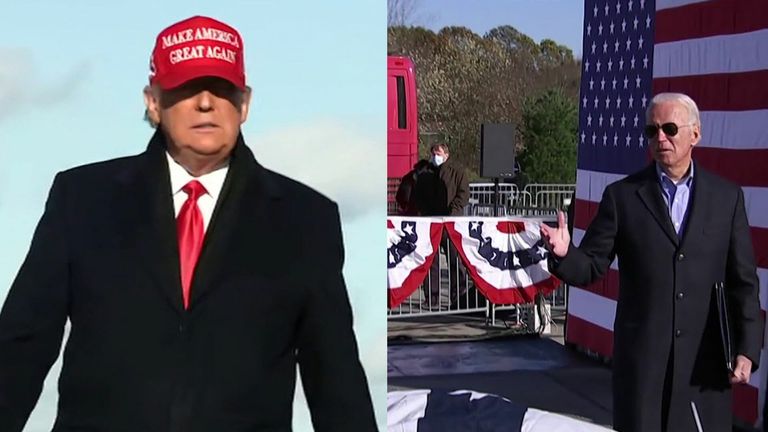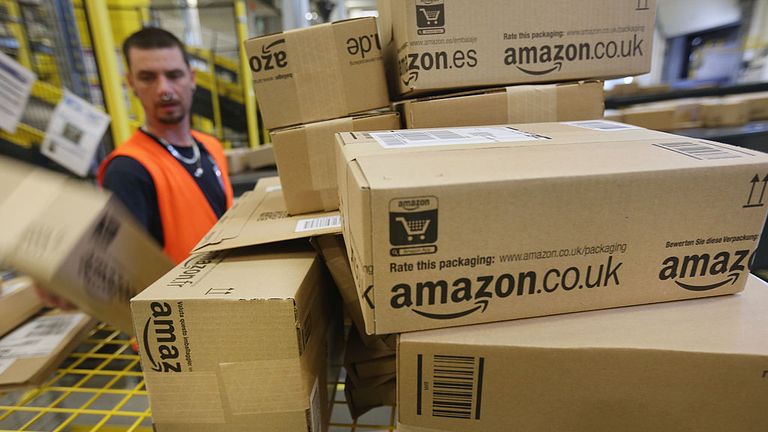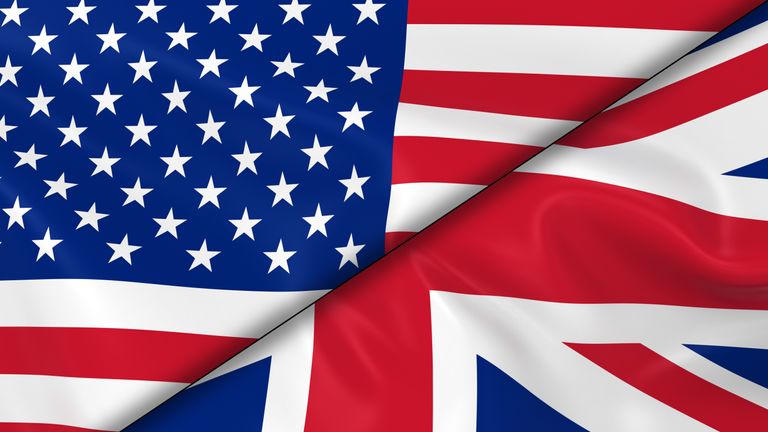The one thing financial markets want from the US presidential election is a clear result.
The worst possible outcome would be a contested result, as in 2000, when it took 38 days for the US Supreme Court to confirm George W Bush’s victory over Al Gore.
Donald Trump’s frequent hints during the election campaign that he might not accept the result have been a trigger for volatility in markets.
So a clear, uncontested outcome, is the main thing investors seek.
One thing they should get, regardless of whoever wins, are more measures to stimulate the US economy.
Both Mr Trump and his challenger, Joe Biden, are committed to further fiscal stimulus to support a recovery from coronavirus.
There the similarities end.
Mr Biden has made clear he wants a significant element of any stimulus package to include more spending – some $2trn (£1.5trn) worth – in confronting climate change.
Shares of alternative and green energy companies have performed strongly during the last four to five months as investors have started to price in the possibility of a Biden victory.
:: Subscribe to Divided States on Apple podcasts, Google Podcasts, Spotify, and Spreaker
Mr Biden’s proposals to decarbonise the economy – he aims to make America net zero carbon by 2050 – also include support for nuclear energy, specifically, encouraging the development of so-called small modular reactors.
Not that Mr Biden would necessarily threaten ‘Big Oil’ in the way Mr Trump has implied during the campaign.
One of the biggest achievements under Mr Trump – a success for which his predecessor, Barack Obama, also claims credit – has been an oil and gas boom making America the world’s biggest energy producer.
Achieving energy independence, reducing America’s reliance on producers like Saudi Arabia, is something every US president has craved since the 1973 Arab-Israeli War – when Richard Nixon was in the White House – tipped much of the western world into recession.
It is an achievement Mr Biden, if elected, will be reluctant to toss away and so, while there will be a greater emphasis on low carbon energy, aggressive regulation of fracking is unlikely.
More broadly, Mr Biden proposes higher levels of government spending than Mr Trump, particularly on infrastructure projects.
As anyone who has used them will know, America’s roads, railways and airports are in a woeful condition in many cases, a consequence of under-investment under both Republican and Democrat administrations.
So a Biden win is seen as supporting construction and building materials companies and their suppliers.
More spending on healthcare is also promised by Mr Biden although not, as many on the left of his party demand, offering universal health insurance for all Americans under a so-called ‘single payer’ system.
The question of how to pay for that extra spending, along with the expansion of social security envisaged by Mr Biden, is another key difference in the two men’s economic policy.
While Mr Trump has made few detailed campaign pledges he has nonetheless made clear that, if re-elected, he will continue with the tax policies that were a hallmark of his first term.
His flagship policy, the Tax Cuts and Jobs Act of 2017, marked the biggest single shake-up of America’s complicated tax system in 30 years.
It saw the US corporation tax rate cut from 35% to 21%, immediately giving the US one of the lowest rates of business taxes in the developed world, while income tax rates were also cut for most working Americans and not, as is often claimed, just the wealthiest.
If re-elected, Mr Trump intends to make permanent some of the act’s temporary measures, which are due to expire in 2025.
These include the lower income tax brackets and wider exemptions for many Americans from inheritance tax.
Beyond that, Mr Trump has said little specific on taxes, other than a pledge to continue cutting them.
By contrast, Mr Biden is planning to raise corporate taxes to 28%, while he also proposes higher taxes for US companies who ‘offshore’ their profits earned overseas.
That measure looks specifically targeted at big US technology and pharmaceutical companies.
As the ratings agency S&P Global puts it: “Under Mr Biden’s plan, most companies would see an increase in their effective tax rates.
“Life insurance underwriters could experience increased tax liabilities and big technology firms like Amazon and Netflix could be forced to repatriate their funds and pay higher effective tax rates.
“If Mr Biden’s proposal were to be enacted, the 10 largest banks in the US could suffer a combined $7bn (£5.3bn) decline in their annual net income.”
But the Democrat challenger is not only proposing corporate tax increases: tax credits are promised for US companies which invest to create more jobs at home.
That might, for example, benefit car makers investing heavily in battery technology and electric vehicles.
Mr Biden’s policies on income tax are less sweeping.
He is only planning higher income tax rates for Americans earning more than $400,000 (£300,000) annually – although he also proposes a rise in capital gains taxes for higher earners and would also cap the ability of households to deduct expenses like local taxes, mortgage interest and healthcare bills from their overall tax bill.
Perhaps the biggest and most significant policy difference, for the rest of the world, concerns trade.
One of Mr Trump’s earliest moves was to end America’s involvement in multilateral free trade agreements like the Trans-Pacific Partnership (TPP) and the North American Free Trade Agreement (NAFTA) and to either re-draw those deals, as he did with the latter, or to seek bilateral trade deals.
The second strand to that approach was to slap tariffs on imported goods.
Ostensibly, this was to encourage US companies to bring back jobs – particularly in manufacturing – that had been outsourced to other countries, but it effectively became a weapon in trade wars.
Scotch whisky manufacturers, for example, currently have a 25% tariff imposed on their exports to the US – part of a wider package of tariffs aimed at punishing EU countries for subsidies handed to Airbus at the expense of its US rival Boeing.
China was targeted even more aggressively.
It follows that another four years of Mr Trump would mean more trade confrontations with both the EU and China.
What is less clear is whether a Biden administration would necessarily result in better trade relations.
There is certainly an expectation that Mr Biden might seek to return to multilateral trade deals rather than pursue bilateral ones.
That is a bad omen for a UK-US trade deal and especially after Mr Biden warned that anything endangering peace in Northern Ireland – a response to Boris Johnson’s threat to over-ride the UK’s withdrawal treaty with the EU – would not go unpunished.
Alternatively, as the economist Roger Bootle has pointed out, were the US to join the TPP – which the UK aspires to do – then the UK could achieve a free-trade deal with the US through the back door in any case.
And there are some trade policies in which Mr Biden is unlikely to differ dramatically from Mr Trump.
He is, for example, just as likely as Mr Trump to oppose the EU’s proposed digital services tax targeting US tech titans.
The EU has also recently been given the go-ahead by the World Trade Organisation to impose tariffs on US imports in response for illegal US state aid to Boeing.
It is easy to see how Mr Trump will react to such tariffs but less easy to see how Mr Biden might.
So, while there are big differences between the economic policies of the two contenders, they also have more in common than first meets the eye.
Above all else, one of the main drivers of the US economy and of US markets presently is the US Federal Reserve, which has effectively cut US interest rates to zero and which is buying billions of dollars worth of assets every month under a scheme better known as quantitative easing.
That, at least, is not going to change any time soon.






